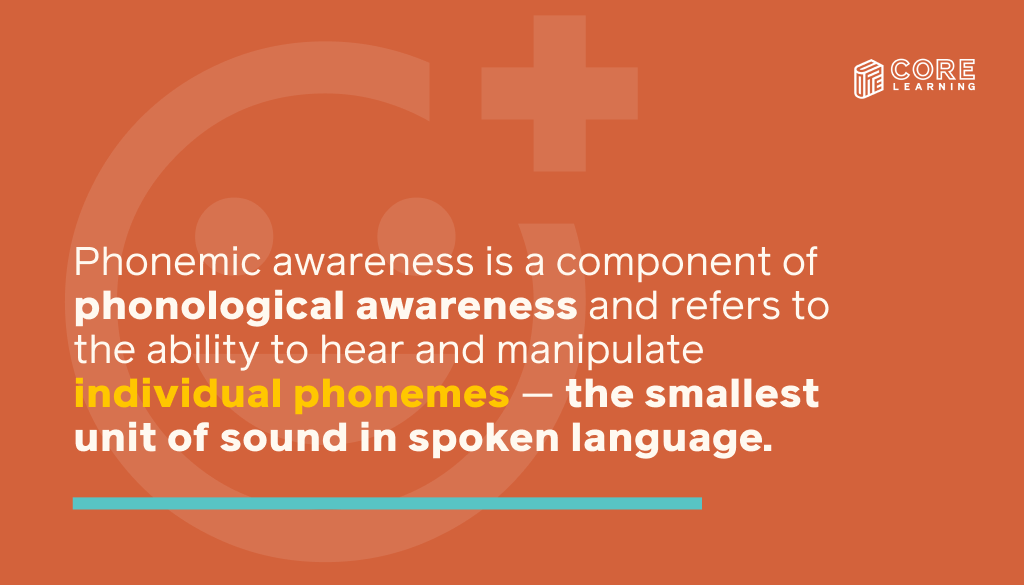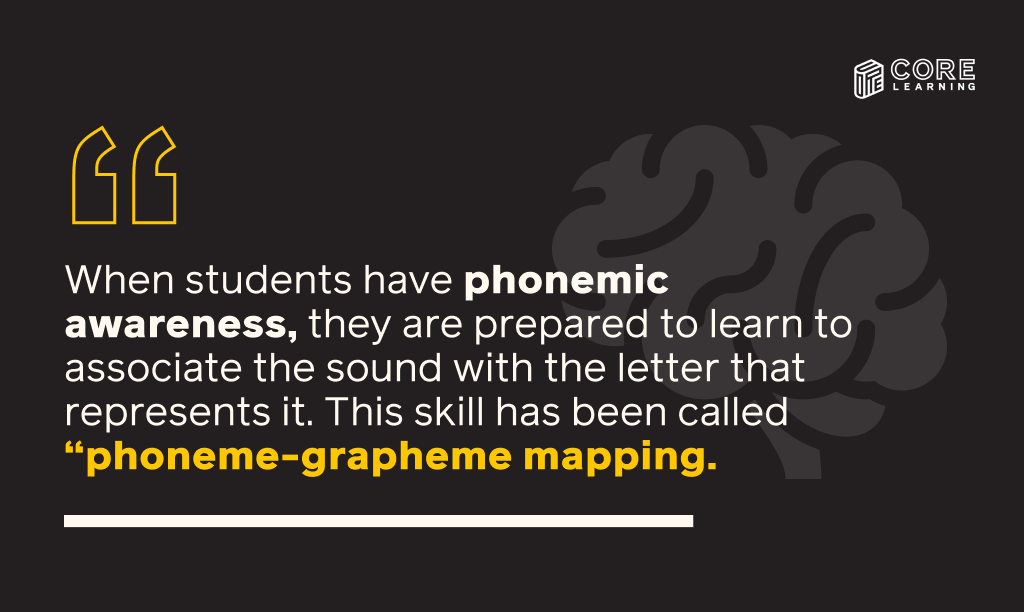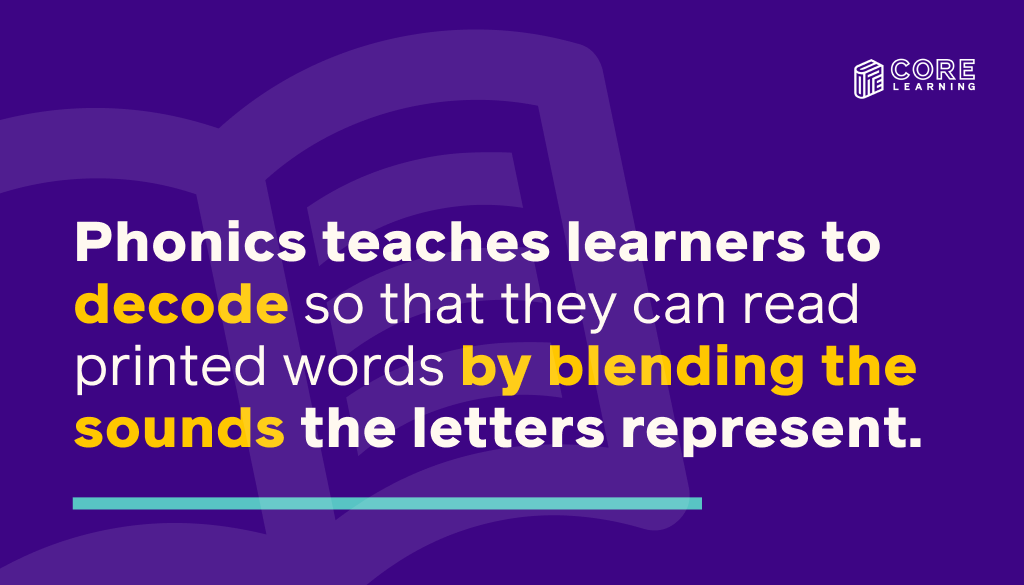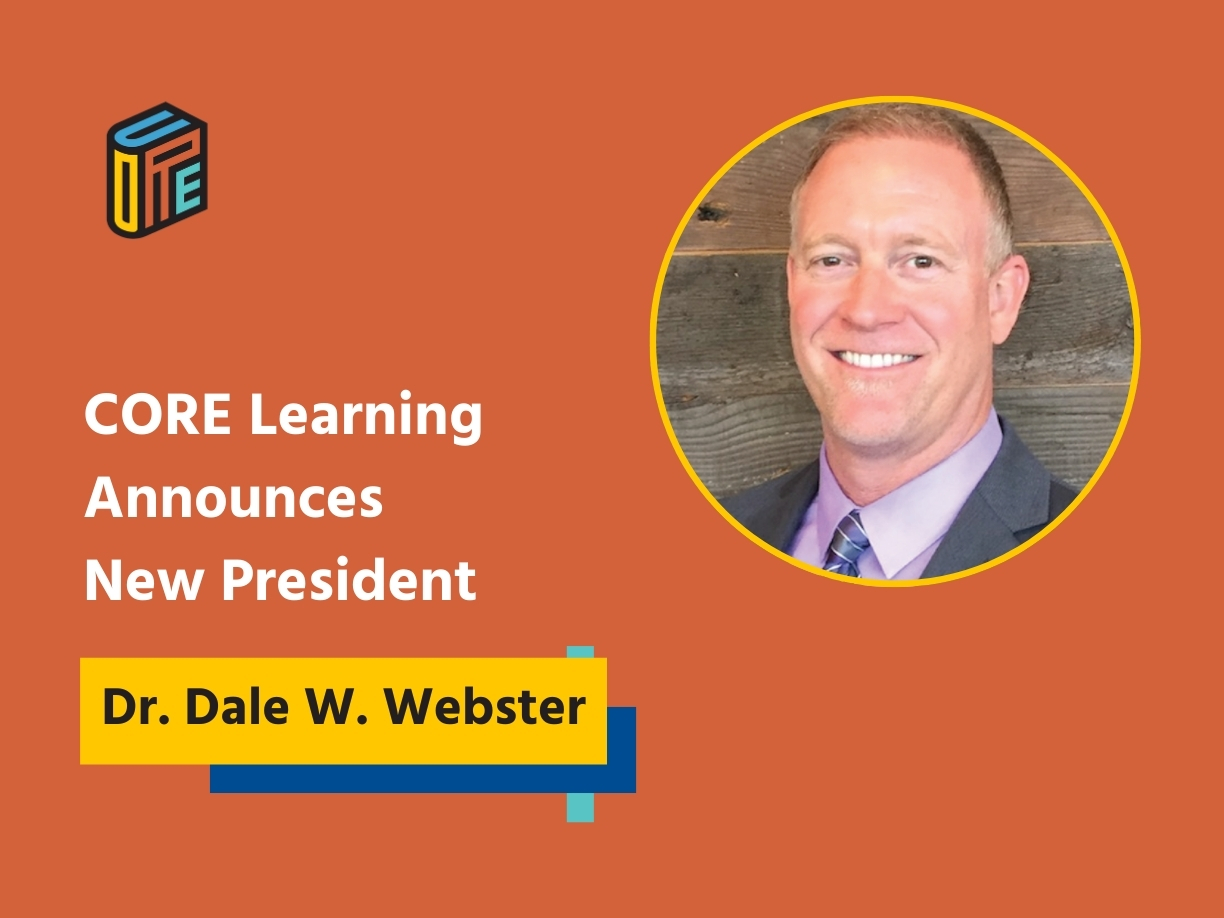
Blog Post
How Phonological and Phonemic Awareness Relate to Phonics Instruction

Phonological awareness, phoneme (aka phonemic) awareness and phonics are foundational skills essential for learning to read words.
Although the terms phonological awareness and phonemic awareness are related, they are not the same. Teachers should have a clear understanding of the difference between the two along with what phonics is, in order to deliver reading instruction effectively and be able to support difficulties when they arise.
This article will cover the distinctions between phonological and phonemic awareness and how the latter supports phonics instruction.
What Is Phonological Awareness?
Phonological awareness is an overarching term that refers to being consciously aware and able to distinguish various sound structures in spoken language such as words in sentences, syllables, parts of syllables (onset/rime), and individual sounds (phonemes).
Through phonological awareness instruction, students learn to recognize and use these units of sound in spoken language.
Segmenting Words and Sentences
Phonological awareness enables students to recognize words as distinct parts of a sentence — also known as segmentation. For example, students may be asked to slowly repeat a short sentence aloud, then count the number of words in the sentence. As needed, a teacher might use visual aids — such as putting a marker on the table for every word spoken — or action cues, like taking a step forward for each word.
Syllable Awareness
In addition to the word level, students develop syllable awareness. Using words of varying numbers of syllables, clap along as you say them to help students learn to recognize syllables. Every syllable has one vowel sound. For example, ask your students: “How many syllables are in the word ‘duck’?” (one); “li-on?” (two); “buff-a-lo?” (three).
Blending Onsets and Rimes
The onset refers to any and all sounds that come before the vowel sound, and the rime includes the vowel sound and the remaining sounds of the syllable. Ask students to identify words by saying the onset and the rime as individual sound structures, for example: “What’s the word? m-an, ch-um, b-all, t-ime,” etc. Then, say the whole word.
Phonological Awareness vs. Phonemic Awareness
Phonological awareness and phonemic awareness are closely linked, so it’s easy to see why many people get the two confused. However, they are not the same thing.
Phonemic awareness is a component of phonological awareness and refers to the ability to hear and manipulate individual phonemes — the smallest unit of sound in spoken language.

Phonemic awareness skills include phoneme blending (combining sounds to form a spoken word), phoneme segmentation (separating a spoken word into individual phonemes), and phoneme manipulation (manipulating a phoneme to form a new word such as changing the /b/ in bat to /c/ to form cat.).
According to the International Dyslexia Association’s article, Building Phonemic Awareness: Know What Matters (9-16-22), “Students who are learning to read must become aware of the smallest segmented parts of spoken words (phonemes) that are represented by graphemes (letters and combinations of letters) in written words. Phoneme awareness is the ability to be aware of and consciously think about these individual speech sounds in spoken words. It is a critical foundational skill for reading.” When students have phonemic awareness, they are prepared to learn to associate the sound with the letter that represents it. This skill has been called “phoneme-grapheme mapping.”

So then, What Is Phonics?
Phonics is a method of instruction that focuses on the relationships between the sounds of the language (phonemes) and the letter or groups of letters in written form that represent those sounds: graphemes. Phonics instruction, therefore, teaches students to understand the alphabetic principle (letters represent sounds in print) and to learn to recognize the letter or group of letters that represent each sound.
Students are taught letter names and then, as phonemic awareness develops, they learn the sounds represented by the individual letters. Eventually, students learn to blend the sounds the letters represent to decode words.
Phonics teaches learners to decode so that they can read printed words by blending the sounds the letters represent. Using their knowledge of letter/sound relationships also enables students to encode – or spell words.

Looking for a phonics lesson plan based on the Science of Reading? Download our free template here.
Phonemic Awareness and Phonics: Why You Need to Know their Relationship
Assessment and Intervention
Understanding the relationship between phonemic awareness and phonics is crucial for identifying strengths and weaknesses in a child’s literacy skills.
For example, if a learner is struggling with segmenting or blending sounds orally, it may indicate a need for focused phonemic awareness development.
On the other hand, if struggling readers have trouble with decoding and word recognition, it may indicate a need for targeted phonics instruction that focuses on blending.
Targeted Foundational Skills Instruction
Understanding the relationship between phonemic awareness and phonics will enable you to provide targeted instruction for unlearned skills.
When a student is unable to identify or isolate sounds in a word (a lack of phonemic awareness), their knowledge of the sound/spelling relationship will be impaired. Targeted instruction to develop phonemic awareness may include intensive (small group) practice with phonemic tasks such as identifying and isolating sounds in the initial, final, or medial position of a word, blending and segmenting words orally and with markers, or deleting/adding a sound from/to a word.
When a student is having difficulty blending sounds into words, intensive (small group) reteaching of the letter names and sounds – perhaps using sound/spelling cards that are available in most reading programs – will be required. This reteaching should be followed immediately with application by leading the students to blend VC and CVC words – initially using a supportive blending technique such as sound-by-sound blending. In this blending technique, the teacher writes the spelling for each sound, and students say the sound. This is repeated until the vowel spelling has been sounded. Then the students blend the sounds through the vowel, after which the sounding and blending continues until the whole word is sounded and then read as a whole word..
Comprehensive Literacy Development
Both phonemic awareness and phonics are crucial components of a comprehensive literacy program that also includes language comprehension development.
Phonemic awareness supports the development of phonics skills, which, in turn, enable children to decode and encode words accurately.
When educators teach these foundational skills explicitly and systematically students can develop a strong foundation for reading, spelling, and writing.
Improve Your Teaching Reading Skills with CORE Learning
Although the importance of phoneme awareness has been recognized since the 1970s, widespread phonological awareness instruction has focused on teaching words, syllables, and onset-rimes before turning to phonemes. It is not necessary for students to master phonological skills before beginning instruction at the phoneme level. Experts are now recommending that the focus for instruction at the phoneme level should start in the beginning weeks of Kindergarten.
Knowing how and when to teach phoneme awareness is crucial to set your students up for reading success. Watch this webinar by literacy researcher Dr. Susan Brady to deepen your understanding of the most effective approaches to teaching phonemic awareness.
You can also sign up for the CORE Learning newsletter to receive tips and resources for educators delivered directly to your inbox!





